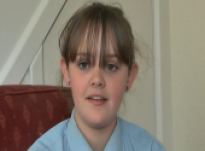Lois

Lois was invited to take part in a double-blind randomised controlled trial soon after diagnosis. She is pleased to be taking part to help others and enjoys some of the tests. She says everyone at the hospital have been really friendly and helpful.
Lois is 14 years of age, White British and lives at home with her parents and siblings. She attends at local school and was diagnosed with an overactive thyroid (Grave's disease) one year ago, when she was 13.
More about me...
Lois aged 14 was diagnosed with an overactive thyroid known as Grave’s disease one year ago when she was 13. Soon after diagnosis Lois was invited by a research nurse to take part in a double blind randomised clinical trial. The nurse gave Lois information and explained to her about the trial. The nurse also gave Lois’s parents information too. Lois can’t remember exactly what was in the information however she says it was easy to read and understand and explained clearly about the trial and what was involved.
The main reason for agreeing to take part was to help other people and to give the doctors a better understanding of the condition. She understands that the purpose of the trial is to find out which is the best medication to take' thyroxine on its own or thyroxine and carbimazole together. She says that she was randomly allocated to the group that is taking the two tables' thyroxine and carbimazole.
Before going on the trial, Lois had to have some tests to ensure she was eligible and met the criteria to enter the trial that involved blood tests, a bone scan, and an iodine test. Lois was pleased she was eligible to take part.
Lois will be in the trial until she is 18; 252 weeks. She attends the specialist hospital on a monthly basis at the moment, although this may change as the trial progresses. When she attends her monthly appointment she also has blood tests, her height and weight checked, and her blood pressure taken to ensure that everything is okay. The appointments are after school so she doesn’t miss too many lessons.
Lois is enjoying being part of the study and is pleased to be helping medical knowledge and other people that may be diagnosed with her condition in the future.
Taking part in a trial made no difference to Lois, she was taking medication anyway. She is pleased to be taking part and helping medical research and helping others.
Taking part in a trial made no difference to Lois, she was taking medication anyway. She is pleased to be taking part and helping medical research and helping others.
Discussing it with family and friends helped Lois make a decision to take part in a trial. She was particularly pleased that it was her decision to take part, or not, and she was given an assent form to sign.
Discussing it with family and friends helped Lois make a decision to take part in a trial. She was particularly pleased that it was her decision to take part, or not, and she was given an assent form to sign.
There can be a lot of tests before you are eligible to start a trial, but knowing you can make a difference to people in the future makes the wait worthwhile says Lois.
There can be a lot of tests before you are eligible to start a trial, but knowing you can make a difference to people in the future makes the wait worthwhile says Lois.
The blood tests enabled the doctors to keep a close eye on Lois and make any changes to the dose if necessary. She was surprised to receive calls at home from the doctors.
The blood tests enabled the doctors to keep a close eye on Lois and make any changes to the dose if necessary. She was surprised to receive calls at home from the doctors.
<
At the beginning of the trial Lois had to miss quite a lot of school because there were lots of appointments, but now she only goes every three months, and the appointments are usually after school hours which is much better.
At the beginning of the trial Lois had to miss quite a lot of school because there were lots of appointments, but now she only goes every three months, and the appointments are usually after school hours which is much better.

